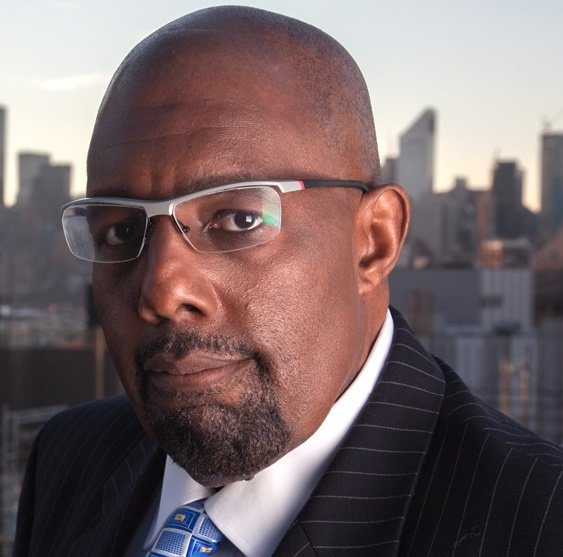
Social media has transformed America’s confidence in law enforcement and the reputations of law enforcement professionals. We asked Matt Horace, a security and crisis management expert, how police agencies around the country can adapt to this new reality. Matt Horace is a 27-year veteran of local, state and federal law enforcement.
He is frequently featured in live broadcast news segments related to homeland security and law enforcement matters on CNN, Headline News, MSNBC, FOX and local affiliates. In his upcoming Hachette book, White, Black and Blue: A Cop Reveals What Happens Behind the Blue Line, he chronicles his career as a black law enforcement officer, the current state of policing in the digital age and his trademarked term, “Coptics.”
You are a recognized expert and have also been on the front lines of law enforcement. Do you think the current media coverage about policing in the U.S. provides the public with a balanced view of that culture and its role in our communities?
Not all — it is actually the opposite. However, perception is reality. According to The Wall Street Journal, citizen confidence in the police is at its lowest point in 20 years among Americans of all ages, education levels, incomes and races. Law enforcement in the United States faces a public relations crisis. The crisis grows with each incident of police action that is caught on video and becomes viral. Even in situations where use of force actions are justified, the public’s perceptions become exacerbated by the existence of video. Unfortunately, that’s true even before incidents have been investigated. In this sense law enforcement is losing the battle of time, because incidents can become viral before police leaders are aware of an incident. The challenge we face is that the “optics” are driving the narrative and the narrative is being driven by visceral, emotionally charged video. This is creating the condition that I call “Coptics, The Optics of Policing in the Digital Age.”
The public doesn’t have a more balanced view because law enforcement organizations have not kept up with the pace of social media and its impact on public perception. Viral video clips of the use of force by police officers permeate our senses and raise many questions. We understand that there are countless stories of police officers doing great things. But “Coptics” is the condition. It presents serious impediments to law enforcement’s ability for building trust within their communities. The actions and behavior of a small percentage of law enforcement officers dominate public perception. But they do not represent the values and behavior of law enforcers on the whole. Further exacerbating the challenge, the negative images are dominating the airwaves. If and when the paradigm shifts, public perception may follow.
What solutions can police executives adopt to address the emerging challenges with policing in the digital age?
Police executives need to commit to police reform. That includes adjusting to policing in the digital age. The convergence of technology, the use of video cameras, police action and community unrest and access have created a public relations crisis for law enforcement in America. Until law enforcement rises to meet the challenges presented by the optics of policing in the digital age, we run the risk of continuing the devolving public relations spiral. This condition has a negative impact on communities and police agencies.
One solution involves executing community policing strategies that engage the community with police and the police with community. Leadership messaging needs to convey that police are the guardians of the community and not warriors against the community. While that process is ongoing, departments should begin to adopt proactive and consistent messaging campaigns utilizing social media and reputation management strategies. The time to incorporate these proactive strategies is before a crisis, not after. In many cases, police departments and chiefs have a fractured relationship with segments of the community before an incident. The incident just exacerbates the condition.
Police departments have historically been more reactive than proactive in their communications. But the public wants to hear from law enforcement, especially during crisis situations. What is your advice to police agencies new to facing such issues?
Every week I am called on to provide commentary on national news programs regarding police use of force. In each case, the incident is uniquely different and the response is equally different. The evolution of CCTV cameras, cell phone cameras, police dashcams and police body cameras has changed our culture forever. Currently, these innovations outpace law enforcement’s ability to maintain a strategy and governance to keep up with them. Culturally, police departments have been oriented to be reactive. From this perspective, police executives need to drive an innovative response utilizing farsighted public information and crisis communication strategies. They need to begin telling their stories and communicating thoughtfully during uneventful times.
That will ensure that they are able to communicate effectively with their community during a crisis. Managing crises means managing reality. Managing perception involves creating and managing a strong online presence, understanding and managing the relationship between public perception and reality, and choosing the best spokesperson to deliver your message. Police agencies need to develop modern preparation strategies: building a crisis communication plan, ensuring that the team is multi-disciplinary, and enlisting the support of professionals. They need a campaign of authentic, positive messages and images that engage public interest and boost public confidence.
Matt Horace is a former Senior Executive Service (SES) rank executive in the United States Department of Justice. He is an advisory board member for the New York-based Federal Enforcement Homeland Security Foundation (FEHSF), past President of the 100 Black Men of New Jersey and an Adjunct Professor at Fairleigh Dickinson University. He is an expert presenter at The Hetty Group’s Coptics Program, which helps police departments become more effective in connecting and communicating with a digital media savvy public. This is the thirteenth in a series of interviews with experts whose work relates to online reputation management.






